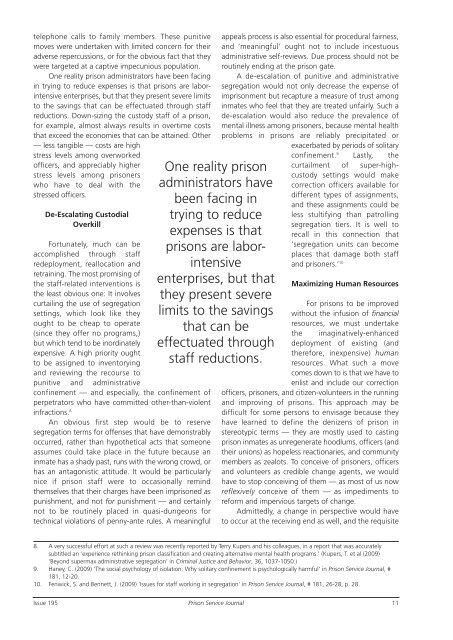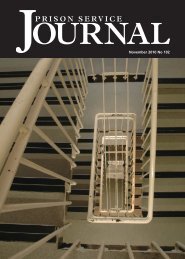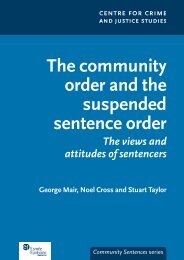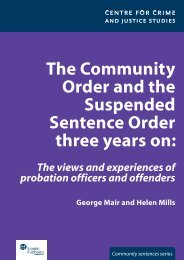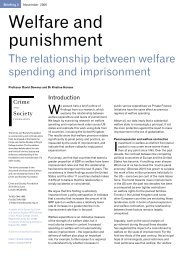Focus on Disability
Focus on Disability
Focus on Disability
Create successful ePaper yourself
Turn your PDF publications into a flip-book with our unique Google optimized e-Paper software.
teleph<strong>on</strong>e calls to family members. These punitive<br />
moves were undertaken with limited c<strong>on</strong>cern for their<br />
adverse repercussi<strong>on</strong>s, or for the obvious fact that they<br />
were targeted at a captive impecunious populati<strong>on</strong>.<br />
One reality pris<strong>on</strong> administrators have been facing<br />
in trying to reduce expenses is that pris<strong>on</strong>s are laborintensive<br />
enterprises, but that they present severe limits<br />
to the savings that can be effectuated through staff<br />
reducti<strong>on</strong>s. Down-sizing the custody staff of a pris<strong>on</strong>,<br />
for example, almost always results in overtime costs<br />
that exceed the ec<strong>on</strong>omies that can be attained. Other<br />
— less tangible — costs are high<br />
stress levels am<strong>on</strong>g overworked<br />
officers, and appreciably higher<br />
stress levels am<strong>on</strong>g pris<strong>on</strong>ers<br />
who have to deal with the<br />
stressed officers.<br />
De-Escalating Custodial<br />
Overkill<br />
Fortunately, much can be<br />
accomplished through staff<br />
redeployment, reallocati<strong>on</strong> and<br />
retraining. The most promising of<br />
the staff-related interventi<strong>on</strong>s is<br />
the least obvious <strong>on</strong>e: It involves<br />
curtailing the use of segregati<strong>on</strong><br />
settings, which look like they<br />
ought to be cheap to operate<br />
(since they offer no programs,)<br />
but which tend to be inordinately<br />
expensive. A high priority ought<br />
to be assigned to inventorying<br />
and reviewing the recourse to<br />
punitive and administrative<br />
c<strong>on</strong>finement — and especially, the c<strong>on</strong>finement of<br />
perpetrators who have committed other-than-violent<br />
infracti<strong>on</strong>s. 8<br />
An obvious first step would be to reserve<br />
segregati<strong>on</strong> terms for offenses that have dem<strong>on</strong>strably<br />
occurred, rather than hypothetical acts that some<strong>on</strong>e<br />
assumes could take place in the future because an<br />
inmate has a shady past, runs with the wr<strong>on</strong>g crowd, or<br />
has an antag<strong>on</strong>istic attitude. It would be particularly<br />
nice if pris<strong>on</strong> staff were to occasi<strong>on</strong>ally remind<br />
themselves that their charges have been impris<strong>on</strong>ed as<br />
punishment, and not for punishment — and certainly<br />
not to be routinely placed in quasi-dunge<strong>on</strong>s for<br />
technical violati<strong>on</strong>s of penny-ante rules. A meaningful<br />
One reality pris<strong>on</strong><br />
administrators have<br />
been facing in<br />
trying to reduce<br />
expenses is that<br />
pris<strong>on</strong>s are laborintensive<br />
enterprises, but that<br />
they present severe<br />
limits to the savings<br />
that can be<br />
effectuated through<br />
staff reducti<strong>on</strong>s.<br />
appeals process is also essential for procedural fairness,<br />
and ‘meaningful’ ought not to include incestuous<br />
administrative self-reviews. Due process should not be<br />
routinely ending at the pris<strong>on</strong> gate.<br />
A de-escalati<strong>on</strong> of punitive and administrative<br />
segregati<strong>on</strong> would not <strong>on</strong>ly decrease the expense of<br />
impris<strong>on</strong>ment but recapture a measure of trust am<strong>on</strong>g<br />
inmates who feel that they are treated unfairly. Such a<br />
de-escalati<strong>on</strong> would also reduce the prevalence of<br />
mental illness am<strong>on</strong>g pris<strong>on</strong>ers, because mental health<br />
problems in pris<strong>on</strong>s are reliably precipitated or<br />
exacerbated by periods of solitary<br />
c<strong>on</strong>finement. 9 Lastly, the<br />
curtailment of super-highcustody<br />
settings would make<br />
correcti<strong>on</strong> officers available for<br />
different types of assignments,<br />
and these assignments could be<br />
less stultifying than patrolling<br />
segregati<strong>on</strong> tiers. It is well to<br />
recall in this c<strong>on</strong>necti<strong>on</strong> that<br />
‘segregati<strong>on</strong> units can become<br />
places that damage both staff<br />
and pris<strong>on</strong>ers.’ 10<br />
Maximizing Human Resources<br />
For pris<strong>on</strong>s to be improved<br />
without the infusi<strong>on</strong> of financial<br />
resources, we must undertake<br />
the imaginatively-enhanced<br />
deployment of existing (and<br />
therefore, inexpensive) human<br />
resources. What such a move<br />
comes down to is that we have to<br />
enlist and include our correcti<strong>on</strong><br />
officers, pris<strong>on</strong>ers, and citizen-volunteers in the running<br />
and improving of pris<strong>on</strong>s. This approach may be<br />
difficult for some pers<strong>on</strong>s to envisage because they<br />
have learned to define the denizens of pris<strong>on</strong> in<br />
stereotypic terms — they are mostly used to casting<br />
pris<strong>on</strong> inmates as unregenerate hoodlums, officers (and<br />
their uni<strong>on</strong>s) as hopeless reacti<strong>on</strong>aries, and community<br />
members as zealots. To c<strong>on</strong>ceive of pris<strong>on</strong>ers, officers<br />
and volunteers as credible change agents, we would<br />
have to stop c<strong>on</strong>ceiving of them — as most of us now<br />
reflexively c<strong>on</strong>ceive of them — as impediments to<br />
reform and impervious targets of change.<br />
Admittedly, a change in perspective would have<br />
to occur at the receiving end as well, and the requisite<br />
8. A very successful effort at such a review was recently reported by Terry Kupers and his colleagues, in a report that was accurately<br />
subtitled an ‘experience rethinking pris<strong>on</strong> classificati<strong>on</strong> and creating alternative mental health programs.’ (Kupers, T. et al (2009)<br />
‘Bey<strong>on</strong>d supermax administrative segregati<strong>on</strong>’ in Criminal Justice and Behavior, 36, 1037-1050.)<br />
9. Haney, C. (2009) ‘The social psychology of isolati<strong>on</strong>: Why solitary c<strong>on</strong>finement is psychologically harmful’ in Pris<strong>on</strong> Service Journal, #<br />
181, 12-20.<br />
10. Fenwick, S. and Bennett, J. (2009) ‘Issues for staff working in segregati<strong>on</strong>’ in Pris<strong>on</strong> Service Journal, # 181, 26-28, p. 28.<br />
Issue 195 Pris<strong>on</strong> Service Journal<br />
11


